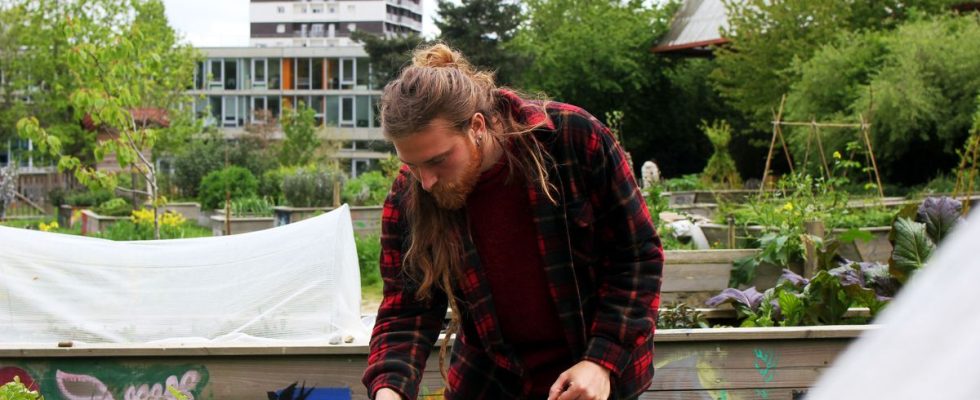It’s barely been a year since they moved into their apartment, but they’ve already transformed their little outdoor space. For the first time, Nicolas and Rachel benefit from a balcony of approximately 9 m² in the popular district of Blosne, in Rennes. Barely installed, the couple immediately wanted to green their outdoor space. “We planted tarragon, wild garlic, different kinds of mint, calendula. And this year, we are going to add tomatoes, basil, borage and nasturtium,” explains the couple. Rachel knows a little about it since her parents and grandparents had a vegetable garden even if she does not keep only good memories of it. “It was the punishment to go and weed. It pissed me off a bit. But there, I want to get back to it, to find these moments again”. Her husband Nicolas is a real novice but is just as excited about the idea of gardening. “We do this together, hands in the ground, far from our phone screens. On the balcony, we can already see the bees and the butterflies coming back”. If their “garden” is modest, it already gives great pleasure to the couple from Rennes. ” I’m a cook. So when I go to my balcony to pick herbs that I have planted, it’s a real pleasure. »
This joy of reconnecting with nature in the city will be at the heart of the 48 Hours of Urban Agriculture which are held this Saturday 29 and Sunday 30 April. Organized by the French Association of Professional Urban Agriculture (AFAUB), the event aims to develop agricultural initiatives in urban areas. The benefit is known: by growing in the city, they are made more durable and more fertile. “My associate conducted research into greening the roofs of Agro Paristech. He was able to see that there were many positive contributions. Better water retention, which limits the saturation of networks in the event of heavy rain, enhanced biodiversity, a fight against heat islands. We can also reuse urban organic waste products to recover them on the site”, explains Clément Lebellé, co-founder of Cultures in the city.
Since 2015, this company in the Paris region has offered professionals to green their roofs by creating vegetable gardens or green spaces. The construction site is vast. According to the Apur (Atelier parisien d’urbanisme), 80 hectares of roofs today in Paris have “a strong potential for vegetation, due to their available surface and their coverage that can accommodate a minimum thickness of substrate sufficient for the development of herbaceous vegetation. “. But even by optimizing all its surfaces, the French capital would be unable to feed its population alone. “We can’t work miracles, but we can have real healthy vegetable production,” says the manager. Last year, 4 tons of vegetables were produced on the 1,000 m² of roofs of Suzanne’s vegetable garden that the company operates in the 15th arrondissement.
“That people can come to see, smell, taste”
If it is so important to accentuate the share of urban agriculture, it is also to educate and make known. Cut off from farms and gardens, city dwellers have gradually lost their connection to seasonality, fed tomatoes and strawberries all year round in their supermarkets. Throughout France, educational gardens are springing up to re-teach residents how the vegetables and fruits they eat grow. “The challenge is to bring the plant back to the city by creating a space that is pretty, pleasant where people can come to see, smell, taste,” explains Malo. Animator for The association Les Cols Verts, in Rennes, he works with schools in the Blosne district, inviting them to the vegetable garden created behind the Triangle hall. “The kids who taste spinach here, they all like it. When we eat what we have sown and nurtured, we take pleasure. Because it tastes good, but also because we understand the history of life,” explains the young man. Where we understand that it takes three months for a potato to grow. Or that pumpkin flowers must be pollinated if they want to bear fruit.
For him, everyone who benefits from an outdoor space should garden. “Quantity doesn’t matter. It is the notion of pleasure that must take precedence. Growing vegetables is a satisfaction. And it also saves money, ”says the Green Collars facilitator. Every day, he sees people from the neighborhood pass by who come to help him or simply approach out of curiosity. “When you see how a plant grows, it changes your outlook on life. You no longer eat the same way, you understand how it works,” says Mustapha. Aged 30, this resident of Blosne came to lend a hand in the collective garden where he planted potatoes and sowed flax. “When you taste after, it has nothing to do, it’s such a pleasure. »

